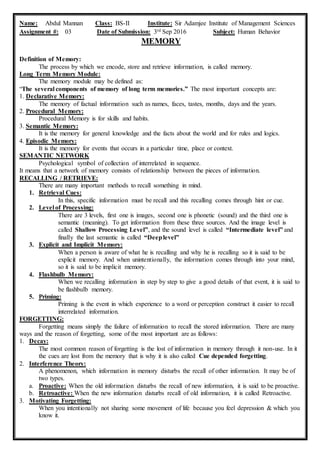Recommended
More Related Content
Similar to Chapter 4 Memory
Similar to Chapter 4 Memory (20)
EDUC-333-INFORMATION-PROCESSING-THEORY-REPORT.pptx

EDUC-333-INFORMATION-PROCESSING-THEORY-REPORT.pptx
Memory ,factors affecting the Memory ,and the types of memories

Memory ,factors affecting the Memory ,and the types of memories
Information Processing Model and its implications in learning and teaching

Information Processing Model and its implications in learning and teaching
7MemoryRevised by Pauline Davey Zeece, University of N.docx

7MemoryRevised by Pauline Davey Zeece, University of N.docx
7MemoryRevised by Pauline Davey Zeece, University of N.docx

7MemoryRevised by Pauline Davey Zeece, University of N.docx
More from Abdul Mannan
More from Abdul Mannan (7)
Chapter 4 Memory
- 1. Name: Abdul Mannan Class: BS-II Institute: Sir Adamjee Institute of Management Sciences Assignment #: 03 Date of Submission: 3rd Sep 2016 Subject: Human Behavior MEMORY Definition of Memory: The process by which we encode, store and retrieve information, is called memory. Long Term Memory Module: The memory module may be defined as: “The several components of memory of long term memories.” The most important concepts are: 1. Declarative Memory: The memory of factual information such as names, faces, tastes, months, days and the years. 2. Procedural Memory: Procedural Memory is for skills and habits. 3. Semantic Memory: It is the memory for general knowledge and the facts about the world and for rules and logics. 4. Episodic Memory: It is the memory for events that occurs in a particular time, place or context. SEMANTIC NETWORK Psychological symbol of collection of interrelated in sequence. It means that a network of memory consists of relationship between the pieces of information. RECALLING / RETRIEVE: There are many important methods to recall something in mind. 1. Retrieval Cues: In this, specific information must be recall and this recalling comes through hint or cue. 2. Level of Processing: There are 3 levels, first one is images, second one is phonetic (sound) and the third one is semantic (meaning). To get information from these three sources. And the image level is called Shallow Processing Level”, and the sound level is called “Intermediate level” and finally the last semantic is called “Deeplevel” 3. Explicit and Implicit Memory: When a person is aware of what he is recalling and why he is recalling so it is said to be explicit memory. And when unintentionally, the information comes through into your mind, so it is said to be implicit memory. 4. Flashbulb Memory: When we recalling information in step by step to give a good details of that event, it is said to be flashbulb memory. 5. Priming: Priming is the event in which experience to a word or perception construct it easier to recall interrelated information. FORGETTING: Forgetting means simply the failure of information to recall the stored information. There are many ways and the reason of forgetting, some of the most important are as follows: 1. Decay: The most common reason of forgetting is the lost of information in memory through it non-use. In it the cues are lost from the memory that is why it is also called Cue depended forgetting. 2. Interference Theory: A phenomenon, which information in memory disturbs the recall of other information. It may be of two types. a. Proactive: When the old information disturbs the recall of new information, it is said to be proactive. b. Retroactive: When the new information disturbs recall of old information, it is called Retroactive. 3. Motivating Forgetting: When you intentionally not sharing some movement of life because you feel depression & which you know it.
